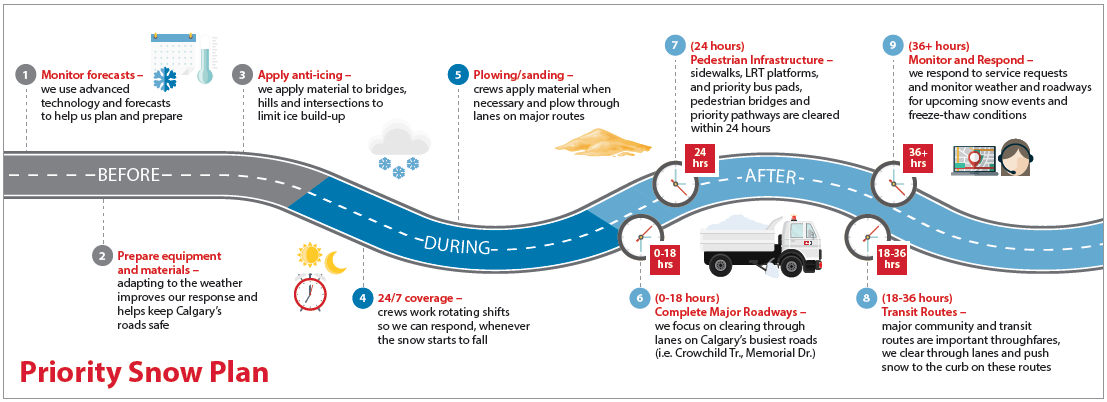Priority Snow Plan
Crews spend the first 36 hours plowing and clearing snow on Calgary’s busiest routes
How The City’s priority-based snow plan works
The priority snow plan is The City's schedule for clearing snow from public spaces. It's approved by City Council and comes into effect once a snowfall ends city-wide. The plan sets out which roads, sidewalks, bikeways, and pathways our crews will clear, to what extent, and on which day within the seven-day plan. See below for the day-by-day priorities.
During snowfall, before the seven-day plan is activated, crews are preparing equipment and materials and working on major routes. The work on majors includes plowing snow in through lanes and applying anti-icing material to Calgary’s highest-traffic routes.
Snow plan priorities
Day 1
(0 - 18 hours after snowfall end)
Crews spend the first 18 hours plowing and clearing snow on Calgary’s busiest routes, which include:
- Calgary’s busiest major roadways. Roads with over 20,000 vehicle trips per day, such as Crowchild Trail and Macleod Trail. (Please note: Deerfoot Trail and Stoney Trail are maintained by the Province)
- Downtown roads and cycle tracks (walking and wheeling lanes)
Additionally, within 24 hours of snowfall end, The City also clears:
- Prioritized pathways
- Sidewalks bordering City-owned properties
- Pedestrian bridges, vehicle bridges, LRT platforms and other public properties with high-volume foot traffic
- Approximately 1,300 high-use bus stops
For a map of priority routes, visit the Snow and Ice Control Priority Routes map.
Day 2
(18 - 36 hours after snowfall end)
Crews spend the next 18 hours of our priority plan focused on high-volume community and transit routes. Priorities include plowing driving lanes/through lanes (not curb or parking lanes) and piling it roadside. Priority 2 routes include:
- Major Community and Transit routes. Roads with more than 5000 vehicles per day, such as Kensington Road and Acadia Drive
- Intersections and crosswalks controlled by traffic lights
- Designated emergency routes (e.g. around hospitals and fire stations)
- Bus routes
- Roads with on-street bike lanes
- Trouble spots
Days 3-7
Once crews have completed work on our major routes we shift focus onto other lower volume routes and duties. Work during this stage includes:
- Remove barriers of snow and ice at important intersections along major routes
- Finishing work on major routes (turn lanes, on/off ramps)
- Levelling ruts in residential areas, if needed. Please note, The City does not clear snow from residential streets.
- Clearing bus stops and designated feeder/collector routes that connect Priority 2 routes.
Priority pedestrian snow clearing
From the time snowfall ends, The City and our contracted partners focus on several active modes, including:
Within 24 hours:
- Clearing snow from sidewalks bordering public property
- Clearing snow from 750 kilometres of pathway
Within priority snow plan:
- Reducing windrows at busy crosswalks and wheelchair curb ramps for better access
*The City is responsible for clearing approximately 10 per cent of Calgary sidewalks. Private property owners have the critical job of clearing the remaining 90 per cent, within 24 hours of a snowfall ending. Learn more about the bylaw requirements and escalating fines for failing to maintain a public sidewalk bordering your private property.
Road Conditions map
View the Road Conditions map to see which roads have been plowed in real time.
Priority 1 and 2 Routes
Check the Priority Routes map for roads designated for priority snow clearing.
Pathway and bikeway snow clearing
To see pathways and bikeways cleared of snow, visit the pathway and bikeway snow clearing map.
Report snow and ice concerns
Report public safety or access issues caused by snow and ice.
Related information
- Snow & Ice Control Annual Report
(Winter 2016/2017) - Snow & Ice Control Annual Report
(Winter 2017/2018) - Snow & Ice Control Annual Report
(Winter 2018/2019) - Snow & Ice Control Annual Report
(Winter 2019/2020) - Snow & Ice Control Annual Report
(Winter 2020/2021) - Snow & Ice Control Annual Report
(Winter 2021/2022)


